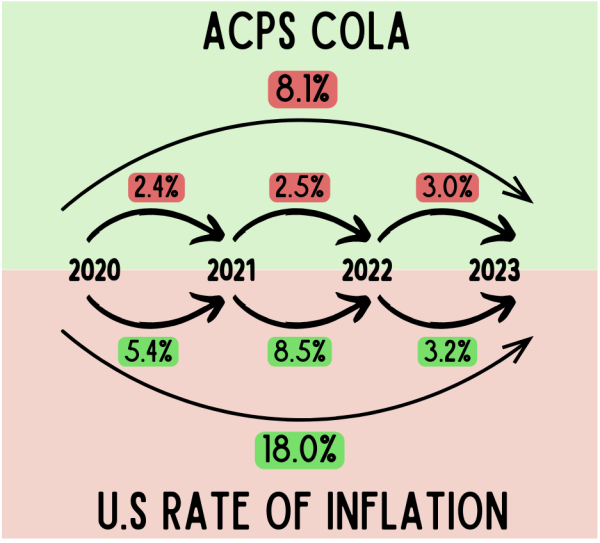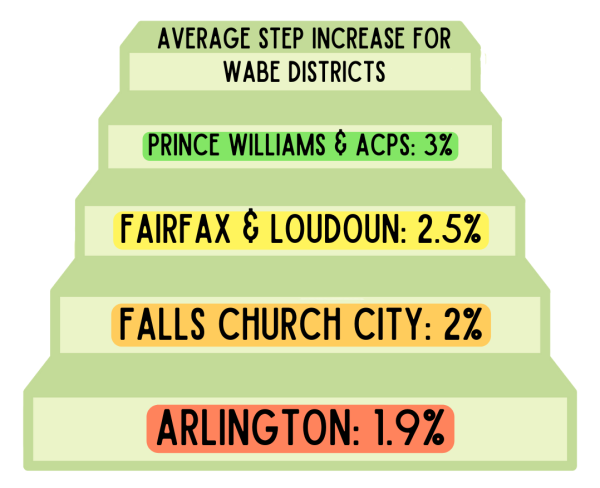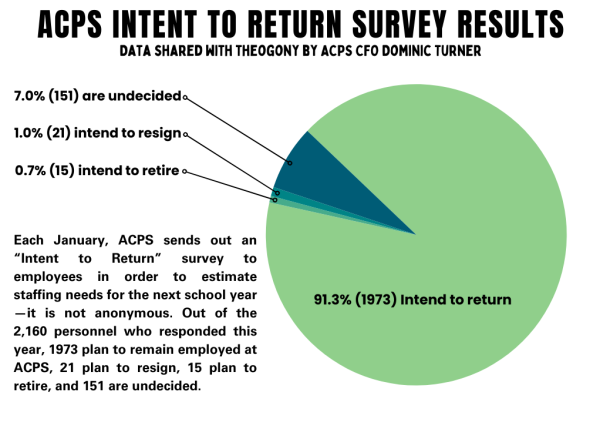After Superintendent Melanie Kay-Wyatt’s, Ed.D., proposed budget for the 2024-25 school year touted a priority of “[teacher] recruitment and retention,” community stakeholders say they are dismayed it left out a cost-of-living adjustment (COLA) for Alexandria City Public Schools staff members.

A COLA aims to reflect the state of the national economy and counteract the effects of inflation. In the three year period preceding July 2023 (when each new fiscal year begins), ACPS has provided teachers a cumulative COLA of 8.1%. In the same three year period, the cost of living in the U.S. has increased by 18%. This disparity is especially heightened in Alexandria, where the cost of living and cost of housing are respectively 36% and 97% higher than the national averages, and where teachers already struggle to make ends meet.
“It’s very difficult to live here,” said Gabriel Elias, an CHS International Academy teacher at Alexandria City High School who led an online effort to advocate for a COLA. “[My family is] a two-teacher family … We bought a house here and we like the area, but we didn’t expect housing prices, inflation [and the] cost of living to go through the roof. As we and our kids get older … it’s making our lives more difficult when the salaries here aren’t even coming close to keeping pace with inflation.”
Baby Steps

Though it omits a COLA, the ACPS proposed budget does include a “step increase” for teachers, which is intended to recognize improved performance as staff gain experience.
“A step increase is a predetermined incremental [salary] increase based on a variety of factors and tied to a salary scale,” said ACPS Chief Financial Officer Dominic Turner. “The average step increase in ACPS for teachers is 3% … the highest increase in the [Washington Area Board of Education] division.”
But Elias says a step increase each year is already part of the expectation when a teacher signs on.
“When you go into teaching, you expect to get a step [increase] every year … because there’s no merit pay, no huge bonuses or $10,000 salary increases,” Elias said. “So you expect a step [increase] … and you expect a [COLA]. That’s just the way it is.”
With the step system, first-year teachers start on step one and are paid the step one salary. They are theoretically supposed to move up a step each year, and in turn receive a higher salary. However, ACPS and other regional districts froze steps in the 2010s multiple times.
Many teachers shared their frustrations with steps in ACPS on a recent Facebook thread.
“[I have] 20 years of credited service and I’m on step 14,” said Charles Barrett Elementary School gym teacher Kevin McGrath. “That’s [a step freeze] once every four years! No, I don’t feel valued.”
“[I have worked] seven years, [and I am on] step four,” ACHS science and IA teacher Kelly Hester said.
“I did the math, and I’m missing $9,000 every year,” said King Street librarian Laurel Taylor.
“I had 20 years of experience when I came to ACPS; they gave me a step 10, and this year I actually went down a step. No one can explain it so it makes sense,” said King Street art teacher Beth Coast. “Glad I’m retiring this year.”
“I also lost a step. Can’t figure that out either. I’m retiring next year,” said William Ramsay Elementary School teacher Anne Elizabeth Boost.
As a consequence of freezes and unequal application of steps, veteran teachers are typically able to earn more money if they transfer to a different district. For example, if a first-year teacher joined ACPS in 2009, they would have worked in the division for 14 years but would only be on step 10. If they decided to transfer to a neighboring district, they would likely be eligible for a step 14 salary there.
“I did the math. If I go to Prince Williams County for next school year, I would make $360 more,” said a teacher who wishes to remain anonymous. “That’s starting to look more appealing.”
The same teacher also shared their annoyance at ACPS handling steps of incoming transfers differently than current teachers.
“This is my eighth year teaching and I’m on step five … I have a teacher friend and we both … [have the] same exact amount of years of experience. She came to ACPS this year and they gave her all her steps. [It’s] very frustrating … Unfortunately, the school board doesn’t see any of that,” they said.
McGrath shared a similar example.
“Someone [who transfers to ACPS] with 15 years [of] experience (six years less than I) would start one step above me on the pay scale. Why would [ACPS] express confusion about retention with this being public knowledge?” he said.
Stakeholders Weigh In
While it is no secret that ACPS is facing teacher retention issues, some School Board members don’t believe that a COLA would necessarily solve them.
“I think pay is 100% essential. People want to get paid, they have to get paid, and they want to be able to live comfortably. I’m not sure that necessarily looking at salaries is going to help us understand why people stay and go,” said member Meagan Alderton at the January 4 work session. “You will hear in this profession over and over again … ‘They can’t pay me enough to do this work.’ If people see that they are driving outcomes for kids, that is fulfilling, and it will maybe even be more fulfilling than a couple extra dollars.”
But teachers, like Ra Alim Shabazz and Elias, disagree.
“There have been critical shortages of teachers throughout the entire nation, and when something is scarce, its value increases,” said Shabazz, a King Street social studies teacher who is also the ACHS building manager to the union-esque Education Association of Alexandria. “We have dedicated, talented, highly educated staff here in ACPS, and it is critical that we issue the COLA.”
“It’s a mistake to not give a [COLA] for all staff,” said Elias. “I think that we need to be regionally competitive with the other districts near us. … I worry that if we don’t put our most competitive package out there this year, more movement and instability will just snowball. … I just want to see everybody stay. I love being here.”
But data shared with Theogony does not suggest many teachers currently plan on leaving ACPS due to the lack of a COLA. Each January, ACPS sends out an “Intent to Return” survey to employees that estimates staffing needs for the next school year—it is not anonymous. Out of the 2,160 personnel who responded this year, 1973 plan to remain employed at ACPS, 21 say they plan to resign, 15 say they plan to retire and 151 say they are undecided. ACPS did not respond to Theogony’s request for Intent to Return data from prior years.

“ACPS thrives because of the diverse talents and perspectives that our staff members contribute,” Turner, the ACPS CFO, said. “We recognize and value the dedication, hard work and contributions that all staff bring to our collective success. We will continue to advocate and work for competitive compensation and benefits for our staff.”
“I think [ACPS] is correct that we are absolutely the most competitive [district] in this area,” said Elias. “But we also have a population that is 40% [English Language Learners], [and] now we’re trying an experimental new high school. It’s not the easiest place to work. … I’m aware that they do offer a very competitive package for the region, but I think it can be better [with a COLA].”
At the January 18 School Board public hearing on the proposed budget, stakeholders spoke in favor of a COLA.
“I am appalled that the proposed budget only accounts for step increases and not a COLA,” ACPS parent Robin Benatti said in a written comment. “This poor decision is going to hurt our students, and further damage our reputation. Teachers in ACPS deserve to make reasonable compensation. This proposal falls short, big time.”
“At a time when inflation is at an all-time high and we are facing the worst teacher shortage in history, our retention strategy should be setting the example in the area. What do you think will happen if we are the only district to not offer a COLA?” said Suzie O’Brien, another parent.
Although most neighboring districts have not yet released their draft budgets, Falls Church (FCCPS) has proposed a 3.5% COLA as well as a step increase, and Fairfax (FCPS) has forecasted a 6% “compensation increase.”
George Mason Elementary School parent Sarah Heckenburg took O’Brien’s perspective even further.
“The truth is, ACPS cannot be compared to other divisions. For better, though more likely for worse, this school system is incredibly unique and challenging. Because of those challenges, our teachers need to be paid significantly higher than other districts,” she said. “No other district is asking people to navigate a 5,000 person-high school, no other district is asking teachers to implement the reinvented, underfunded TAG program, no other district treated Encore teachers quite as badly as ACPS did last year, no other district is rolling out the High School Project plans. . . All of these things make working at ACPS harder than other districts. Compensation must be adjusted accordingly!”
ACHS senior Yahney-Marie Sangare, the president of ACHS’s NAACP chapter, spoke on how a COLA would affect students.
“Teacher retention and recruitment issues are ultimately also student issues,” she said. “As students, the quality of our education rests on the quality of our teachers’ work environment. … If [ACPS is] a student-first institution, [it] must understand the fundamental interconnection of staff and student issues. I urge the board to hence evaluate the budget and be transparent with the community on the lack of COLA”
In his comments, Jefferson-Houston Middle School science teacher David Paladin-Fernandez compared the differences between a COLA and step increase. This comes after Turner said the two are “essentially” the same thing at the January 4 budget work session.
“Members of ACPS leadership [have been] suggesting the preposterous idea that a step increase is the same thing as a cost-of-living adjustment,” Fernandez said. “A step is related to my experience and loyalty to the organization, and a cost of living adjustment is related to larger economic realities we have no control over. They are not the same thing and it should be recognized in this budget. … Do you really think the logic [that] a step is the same thing as a cost of living adjustment flies when inflation has seen people’s grocery bills balloon? Do you really think that this logic is attracting the best and brightest to ACPS?”
Turner later clarified to Theogony that “a step increase moves an employee closer toward the top of salary scales, while a [COLA] increases the value of every step, thus increasing the maximum pay an employee can earn.”
A presentation to ACPS teachers in June of last year also considered the differences between a step increase and COLA/market rate adjustment (MRA).
“Only a COLA/MRA allows you to reach new heights. This means it allows for your maximum salary to increase, while a step increase puts you one level closer to [an ultimately] lower salary,” it said.
According to Turner, the terms COLA and MRA “can be interchangeably used” regarding ACPS budget policy.
“Last year, they made the argument that [a COLA] was more important than a step,” said Elias. “It’s just completely unpredictable. The pay has to be predictable. It has to be the same [approach] every year. We have to know where it’s going.”
The ACPS proposed budget actually does contain an MRA, but it is almost exclusively reserved for central office and administrative staff—not teachers. At a budget work session, Turner said this is because “those job classes [are] significantly below the market rate.”
‘If they can make that case… we’ll listen’
Although all public commenters at the meeting who addressed a COLA were in favor of implementing it, School Board Chair Michelle Rief maintained that the decision is not as simple as it may seem. According to Rief, the City Council projects a “2-3% increase” in city funds to ACPS, but the proposed budget assumes a “4%” (or $10.3 million) increase. With a 1% COLA costing $2.7 million, adding any COLA to the proposed budget would almost certainly require a far greater increase in funding from the city than the projection of 2-3%.
Additionally, subsidies at the state level may be in jeopardy.
“The other thing [is], we had a legislative update . . . in which we got an overview of the governor’s proposed budget to the state legislature,” Rief said at the January 18 work session. “And that actually had a reduction in [state funds given to ACPS] of about $1 million, [while the proposed budget assumes an increase of $2.58 million].”
Rief also noted increases to teacher salaries ACPS has already provided.
“The FY2025 proposed budget does include a step increase for all eligible staff, [and] we have a 3% MRA that went into effect at the beginning of the current academic year,” she said. “ACPS was also able to provide an additional mid-year 2% raise to all eligible staff this month. This 2% increase is included in the proposed 2025 budget. I just wanted to clarify that.”
As part of the 2023 state budget, Virginia paid school districts $54.6 million to give teachers statewide a 2% raise. While Governor Glenn Youngkin, Kay-Wyatt, Rief and other Board members described this increase as a “mid-year raise,” Turner referred to it as an early MRA for the upcoming year.
“You will find that ACPS has included both an MRA (eligible staff received this in January 2024) and step increases (eligible staff would receive this in July 2024) in the [proposed budget],” he said. “ACPS was afforded the opportunity to provide a market rate adjustment to staff salaries in advance of the 2024-25 contract year, showing a 2% increase on their January 12, 2024 paychecks. Typically, staff receive any approved salary adjustments in July when the new school year begins. This year, we were fortunate to provide staff with a salary adjustment six months ahead of schedule.”
Shabazz pushed back against this perspective.
“I’m not actually in agreement with that concept,” he said. “What I know for certain is that a COLA is a cost of living adjustment because of inflation, [and] a raise is actually about meritorious service [and] loyalty to the organization.”
Shabazz also clarified the impact of a COLA in relation to the overall economy.
“Let’s be clear. What a COLA does is it maintains — it doesn’t increase, it simply maintains — the same buying power that you had the previous year,” he said. “The cost of living increases about 4% each year. If you have a situation where [ACPS is] not granting COLAs, even with a raise, it erodes the buying power. I don’t think that that is the true spirit of the raise.”
And while Youngkin touted the raise as demonstrating his “commitment to our students and teachers,” allocation of state funds is not that simple.
As Rief explained in a Facebook post, “Alexandria’s Local Composite Index (LCI), [a complex formula that calculates how much money Virginia localities are required to contribute to their school districts], is .80, which means our city is expected to pay 80% of the cost of operating our school system. Additionally, ACPS hires many more positions than the state’s Standards of Quality (SOQ) require, and the state does not contribute funding towards these positions. I would love to see Alexandria Residents advocating to legislators in Richmond to invest more state funding in public education.”
But what state legislators may do is unclear.
“This is a tough budget year. There are a lot of my colleagues on the Finance and Appropriations Committee that would like to see us put more money into education, but [due to the LCI] we would pay 20% of Alexandria’s cost under the current formula,” Virginia state Senator Adam Ebbin, whose district encompasses Alexandria, said. “We do need to better fund teachers and we need to put more money into education in general, but I’m not sure what’s going to happen this year yet. . . I think Democrats are looking to find savings in other parts of the budget to better fund education, but I can’t give any hard numbers.”
Delegate Alfonso H. Lopez, who represents part of Alexandria in the Virginia House of Delegates, echoed Ebbin’s thoughts.
“I haven’t gotten in the weeds and I’m not on [the Finance and Appropriations Committee], but I know that our caucus has talked a great deal about fundamentally changing how the budget is going to be drafted, especially as it relates to K-12 funding,” he said. “Paying our teachers and our counselors and our staff a living wage, so they not only want to continue working but also [are able to] live in the community, is vitally important. I’m very excited about the work that’s being done by the Appropriations Committee to change what the governor has proposed and move Virginia forward in the proper direction.”
Things are looking more optimistic for COLA-proponents in the city-wide budget, though.
“I’d love for ACPS to fight for what it needs … If they need to compete for teachers, which they do, [then they should] do what they’ve got to do,” said City Councilman John Chapman. “At the end of the day, if School Board comes up and says, ‘Hey, we need this,’ if our teachers say ‘We need this,’ [then City Council] will fund it.”
“As an ACPS parent and a long-time policy-maker, I strongly support competitive compensation to ensure that ACPS attracts and retains the best educators in the region,” said Mayor Justin Wilson. “I will leave it to the School Board to make their judgments without me putting my finger on the scale at this point in the process. But it is important to note that there are a limited amount of resources available during the budget process, and the City Council must weigh the expenditure of additional funds for ACPS against the other priorities of our local government, including Police, Fire, Human Services, Transportation, Recreation, infrastructure and more.”
Still, the City Council has historically supported the ACPS budget.
“Generally we have fully funded their request, as the [School] Board has largely adhered to formal or informal revenue guidance provided by the City Council or the City Manager on the Council’s behalf,” Wilson said.
“I don’t think there has been a situation, especially in the last 7-8 years, [in which] we haven’t funded the full operating request [from ACPS],” said Chapman. “If they say they want [funds for a COLA], and if they can make that case — where, frankly, in this competitive region, I think they can, — then I think we’ll listen.”
Next steps
According to a presentation from the January 18 work session, School Board members have submitted questions about the budget which have been publicly responded to by Central Office staff. In the coming days, members can submit add/delete requests, and an add/delete work session will take place February 8. Since the budget is legally required to be balanced, all additions must re-allocate existing funding, and a two-thirds majority vote is required to request new funding from City Council. The School Board is set to approve the budget on February 22, and pending edits from City Council in May and June, its final draft will be adopted on June 6.
“We need urgency,” said Elias. “I think everybody wants the school system to succeed. The question is: how do we collaborate and how do we make sacrifices on both sides and work together as a community to make this happen? I think it just has to be out in the open, honest and a group effort.”
“My interest is always in the bottom line. The proof has never been in the pudding—it’s been in the tasting,” Shabazz said. “So [I support] whatever needs to be done to ensure that our dedicated staff get a [COLA] … It is important to feel valued by your school system, particularly when you are scarce — I want to repeat that educators are scarce in this nation, — [so] it is critical that we reward those who are dedicated to the upliftment and the education of students.”
Although the ACPS communications team did not provide comment from Superintendent Dr. Melanie Kay-Wyatt at time of publishing, they later shared, “Dr. Kay-Wyatt supports and agrees with the responses and information shared by Mr. Turner.”
Yahney-Marie Sangare is a Theogony Co-Editor-In-Chief. She was not involved in the writing of this article.
James Libresco submitted written comments to the School Board requesting funding for student-athlete mental health resources at the budget hearing. This has not biased his reporting.





Patrice Cunniff Linehan • Feb 10, 2024 at 9:10 am
Wow! Congratulations on a well-researched and well-balanced report about the ACPS budget and the intersection of the proposed spending with the City budget. I encourage the journalism department and administrative leaders at Alexandria City High school to promote the excellent work of author/editor, James Libresco, to the Washington Post, City of Alexandria papers, and other media outlets.
In the past, I served as the school representative to the City’s Budget and Fiscal Affairs Advisory Committee and I recognize the complexity of these issues. This article provides a great foundation for further public engagement and informed decision-making on the budget.
Thank you for the obvious time and effort you put into this feature article!
I’ve worked in the education field for 35+ years and research consistently tells us that the number one indicator of positive student outcomes is family circumstances, followed by teacher quality (& school connectedness). My sons graduated from ACPS so I don’t usually see Theogony. I was fortunate that a neighbor forwarded this article to me.
The wider public needs to see it, too!
I plan to personally act on what I learned here and encourage others to advocate on behalf of students and staff. The graduates who continue to live and work in the City will shape the future for all of us. Investments in strong families and lifelong learning are imperative! I encourage everyone to advocate for these important issues by voting as if there is a young person standing with you at the polling booth.
Mary Jo Johnson • Feb 3, 2024 at 2:33 pm
Our teachers care for and educate our children. They work hard for our children
They deserve our SUPPORT and a COLA in this time of inflation!
Thank you for the well written article on the situation and calling our attention to it.
Mary Jo Johnson
Sally Hunnicutt • Feb 1, 2024 at 9:54 pm
Kudos on an exceptionally well written article. I appreciated the depth of analysis and the inclusion of views from so many key stakeholders. The article does a great job of breaking down a highly complex topic. It is a must read for city residents and the ACPS community.
I am disappointed that the Superintendent did not respond to the request for comment.